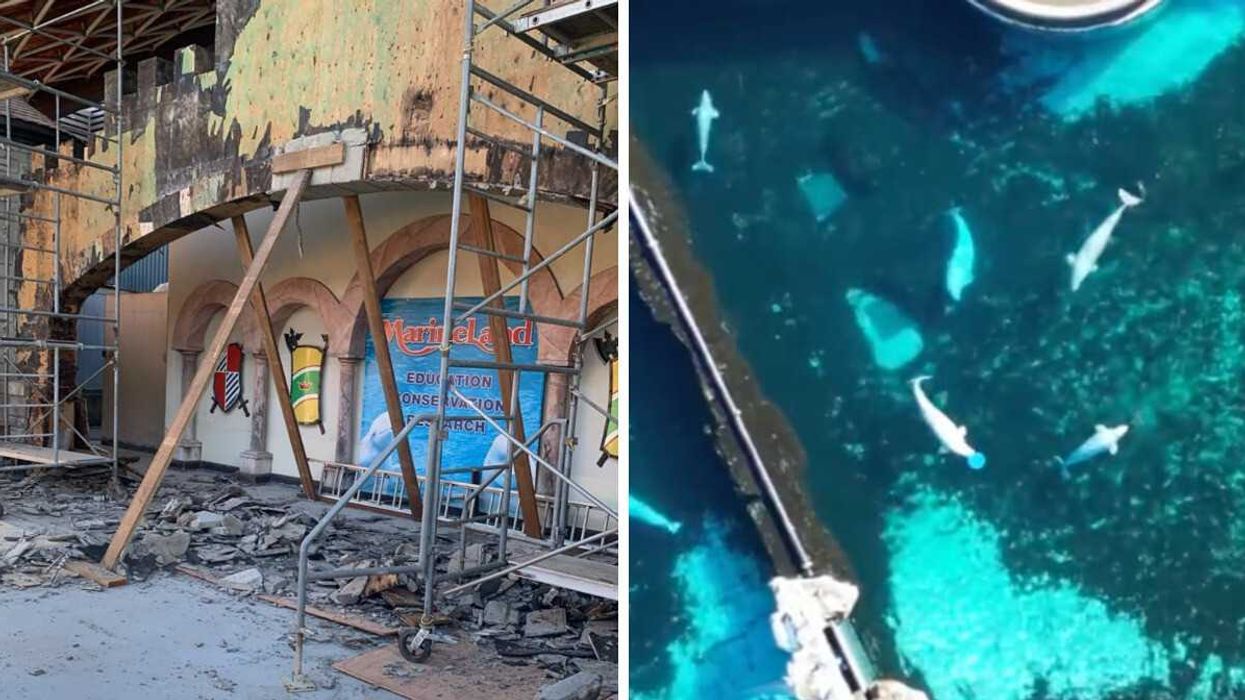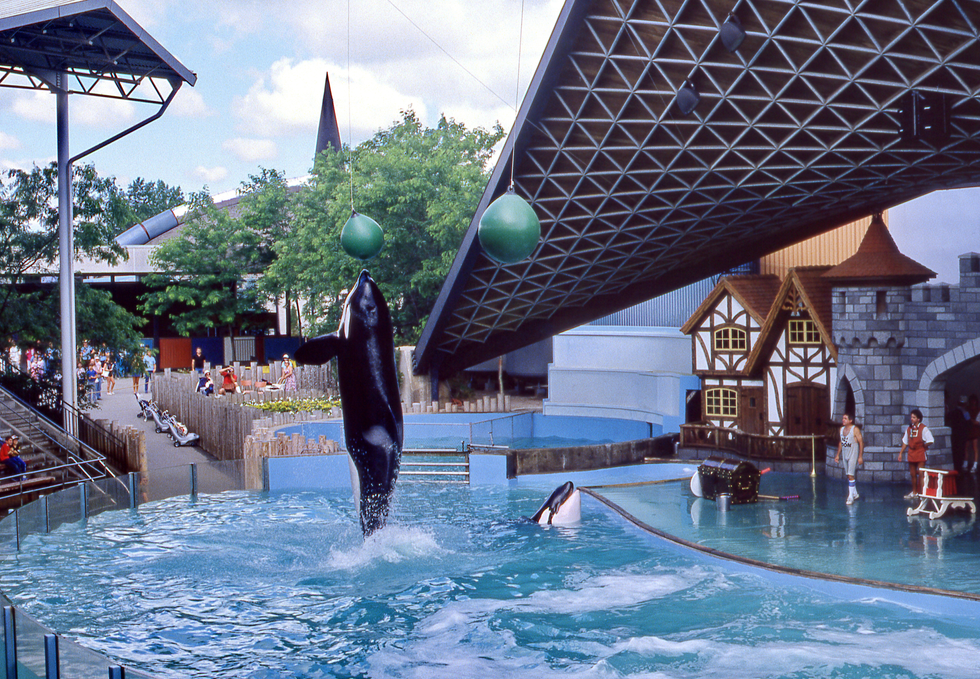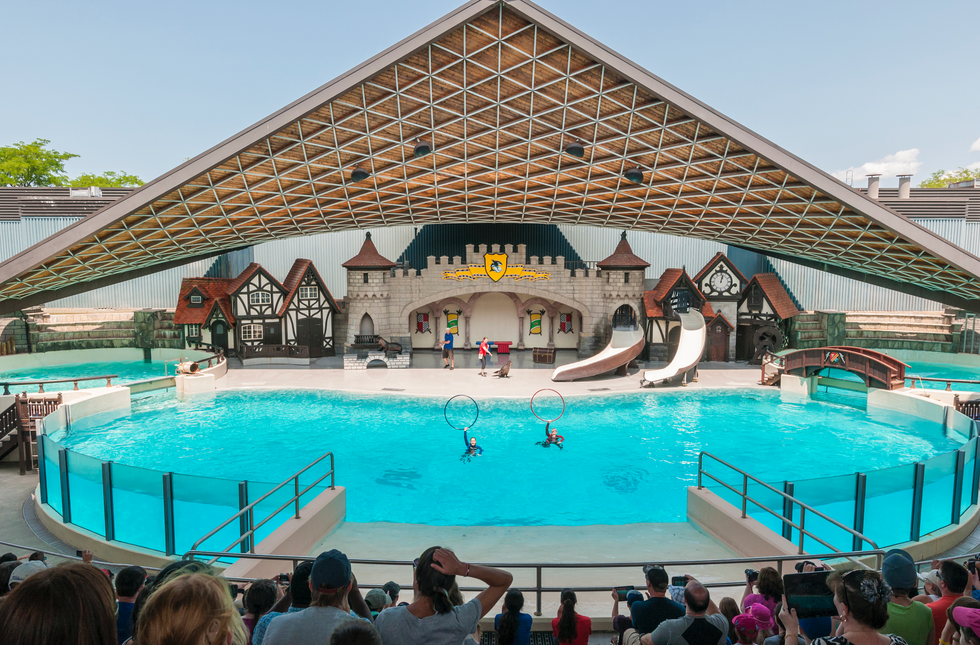The Marineland from your childhood is dead: Inside the grim reality of what's left behind
Recent drone footage from the semi-abandoned site shows the animals who've been left behind.

Inside the grim reality of Ontario's Marineland, where Canada's last captive whales wait to die.
Once a mainstay of Canadian family tourism, Marineland spent decades drawing crowds to Niagara Falls with its marine animal shows, amusement rides and a jingle that became part of national culture. But in 2025, the once-busy theme park is all but abandoned — closed to the public, its attractions being dismantled and sold off piece by piece.
What remains behind the locked gates is little more than a handful of beluga whales still circling swimming pool-sized enclosures, out of sight from the crowds that once filled the park.
Over the past ten years, Marineland has become a focal point of controversy. A series of high-profile animal deaths, repeated investigations by Ontario's animal welfare authorities, and growing pressure from advocacy groups have cast a long shadow over the park's legacy.
Now, with the future of the site and its remaining animals in question, many are left wondering what will happen next to the once-adored Niagara Falls theme park.
Here's a closer look at Marineland's rise to national prominence, its long fall into controversy, and the unresolved future of the animals still living there.
This article contains content that may be upsetting to some of our readers.
Everyone loves Marineland
For more than half a century, Marineland was one of Ontario's most recognizable summer destinations. Located just minutes from Niagara Falls, the sprawling 1,000-acre park blended marine exhibits, thrill rides, and wildlife displays into a uniquely Canadian brand of family entertainment.
Its jingle — "Everyone loves Marineland" — aired relentlessly on radio and TV throughout the '90s and early '00s, cementing the theme park in national consciousness well beyond Ontario.
At its peak, the park drew millions of visitors annually. Guests lined up for sea lion shows, watched dolphins twirl at King Waldorf Stadium, and crowded the edges of Friendship Cove to catch glimpses of the park's famous beluga whales.
Beyond the animals, Marineland offered a full amusement park experience: looping roller coasters, spinning rides, Ferris wheels, and carnival-style attractions. There were red deer and bears on display, themed restaurants like the Hungry Bear, and a gift shop selling dolphin-themed merch and plush orcas by the dozen.
At its peak, Marineland was one of Canada's most ambitious amusement operations. But behind the cheerful aquatic branding, Marineland had a more complicated legacy — one that would become increasingly difficult to ignore.
A slow decline
Marineland's beginnings were modest. When it opened as "Marine Wonderland" in 1961, it was little more than a sea-themed roadside attraction founded by John Holer, a former circus animal trainer who saw potential in combining marine life and entertainment near one of Canada's most visited natural landmarks.
Over the next few decades, the park expanded rapidly. Holer added more animals, dramatic shows and eventually amusement rides, transforming the renamed "Marineland of Canada" into a full-scale theme park.
But concerns about animal welfare were present even in its earlier years.

According to former employees, by the 1990s and early 2000s, animal rights groups had begun raising alarms about conditions at the park. Critics pointed to the size of Marineland's enclosures, the behaviour of the animals in captivity, and the ethics of keeping whales and dolphins for entertainment.
However, these concerns were largely overshadowed by the park's popularity and visibility in national advertising campaigns.
The turning point came in 2012, when former Marineland animal trainer Phil Demers went public with allegations about the mistreatment of animals and deteriorating conditions behind the scenes. His claims prompted media investigations, civil lawsuits, and a growing movement of activists calling for the park to be shut down.
In the years that followed, speculation about went on behind Marineland's gates persisted. Former employees and activists raised concerns about the burial of animals on-site, suggesting that some deaths may not have been appropriately documented. In 2013, Marineland was ordered to stop burying dead animals on its site, amid allegations from ex-employees of mass graves containing thousands of bodies.

Still, the park continued to operate. But Marineland faced growing scrutiny over its cetacean care.
According to CBC News, since 2019, at least 20 whales and dolphins have died at the park, including 19 belugas and one orca. Each death reignited public concern and brought renewed attention to the facility's practices, despite park officials maintaining that the animals were well cared for and that deaths are a natural part of life in captivity.
By 2020, Ontario's Animal Welfare Services (AWS) had launched a formal investigation into the park. A year later, according to The Guardian, the agency declared that Marineland's marine mammals were in considerable distress due to poor water quality and issued orders for the park to upgrade its systems.
Marineland initially challenged the ruling but later dropped the appeal and made changes to its water infrastructure.
Later, in 2024, Marineland was found guilty, under Ontario's animal cruelty laws, of neglecting three young black bears who were kept in small enclosures with inadequate access to water for months.
Inspectors are believed to have visited the property more than 200 times since the investigation began five years ago. While AWS says oversight remains ongoing, little public information has been released about the results of those inspections. Several enforcement orders reportedly remain active.
The park's founder, John Holer, died in 2018, followed by his wife, Marie, in 2024. Management has since confirmed that the park is transitioning to new ownership, though no buyer has been announced.
A semi-abandoned Marineland
Public sentiment has changed a lot since former trainer Phil Demers first spoke out over a decade ago. Growing awareness around captive marine mammals — along with legislation banning the breeding, sale or acquisition of new whales and dolphins in Canada — has left Marineland without a path to expand or replace its animals.
"People are waking up to the fact that … putting [a whale] in a glass jar is just about as cruel as it gets," said Demers, per The Guardian.
By 2024, the visitor experience at Marineland had been scaled back to a splash pad, limited animal viewing and a small gift shop. The website's FAQ listed a "modified experience" without the rides, educational shows, land‑animal exhibits, and The Hungry Bear restaurant.
By mid-2025, it became clear that Marineland, at least as most Canadians knew it, no longer existed. In June, the park publicly listed its rides for sale, including its "thrill rides and family-friendly favourites."
Other signs of the park's gradual shutdown followed. According to reports, the King Waldorf Stadium stage was dismantled, and portions of the property were severed to allow for refinancing.
By the summer, it became clear that the park, which once opened every year from spring through to Thanksgiving, would not be reopening to guests in 2025. No seasonal staff were hired, and its phone lines have been disconnected. No timeline for reopening has been announced.
Despite this, behind the gates, a small number of marine and land animals remain on site. According to the most recent estimates, around 30 belugas are still housed at the park, along with a handful of dolphins, sea lions, seals and deer.
In June, a YouTube video posted by the account MadLab Press showed drone footage of Marineland's grounds. The video captured dolphins and belugas swimming in small pools, some of which appeared to be partially covered in algae. Rusting infrastructure and unused animal enclosures were also visible, along with rides no longer in operation.
A few months later, CBC obtained additional footage showing the remaining Marineland staff interacting with the animals left at the park. In the video, employees can be seen feeding and handling the belugas and dolphins.
For now, access to the grounds remains restricted. While the animals continue to be housed on-site, they are no longer visible to visitors, and the park has offered no recent public updates about their care. What is known, though, is that these animals are now impeding the sale of the park's land, which is believed to be worth hundreds of millions of dollars.
Canada's last captive whales
What happens next to Marineland's remaining whales is complicated.
Earlier this year, after another beluga death and amid growing public pressure, Marineland applied for a permit to export its remaining belugas to a marine park in China. The request was denied by Canada's fisheries minister, who — alongside multiple animal welfare organizations — cited concerns about animal welfare at the proposed facility.
In response, Marineland warned that it might not be able to continue caring for the animals, raising the possibility of euthanasia.
This drew further criticism from advocates and observers. Critics pointed to the park's lack of a long-term plan, and a troubled history with previous transfers (three of five belugas sent from Marineland to Connecticut's Mystic Aquarium in 2021 died within a year).
The absence of appropriate facilities equipped to take in so many animals complicates matters further.
Some activists have proposed immediate interventions. Ontario's Provincial Animal Welfare Services (PAWS) Act, for example, gives the province authority to seize animals in distress. Others have suggested relocating the whales in smaller groups to different accredited aquariums.
The Whale Sanctuary Project in Nova Scotia — one of the few known genuine sanctuaries in development — has offered to eventually accept 8 to 10 whales, but is not yet operational.
Some advocates have proposed other seaside sanctuaries, such as the SEA LIFE Trust's Beluga Whale Sanctuary in Iceland. But still, experts have raised concerns. "Everything is different. The weather conditions are changing. The temperature is changing," Javier Almunia, a marine biologist and co-author of a 2025 study on the facility, told CBC.
"It's not an option for animals tomorrow," he said. "It might be an option for animals in 10 or 20 years."
Almunia believes that for Marineland's belugas, a conventional aquarium may be the most realistic solution: "They are used to management — the link with the trainer, with the caretakers."
However, the options in Canada are limited. The Vancouver Aquarium, which once held captive whales, has already said it cannot take Marineland's animals, citing "legal, regulatory and operational constraints."
Releasing the whales into the wild is also considered an unlikely outcome. Experts told CBC that in an environment they've never adapted to, these whales — raised in captivity — face a life of rejection, starvation and loneliness.
While discussions about what to do next are ongoing, the park's finances continue to deteriorate. Niagara Falls Mayor Jim Diodati recently told the media that Marineland officials can no longer afford to maintain the site.
"Unfortunately, they're telling us they're burning the furniture to heat the house," he said. "There's no money."
Behind the scenes, provincial officials say they're exploring options — but no formal action has been taken. Federal and provincial governments can't seem to agree who should be managing the Canada's last captive whales, with Ontario Premier Doug Ford accusing Ottawa of creating the mess, while federal officials maintain the animals' wellbeing is a provincial problem.
What is clear, however, is that keeping the animals at Marineland is far from a sustainable long-term solution. In August, another beluga died following an incident involving trespassers at Friendship Cove. According to Global News, a group entered the site illegally and allegedly provoked the animals. The whale, an older male, died days later despite efforts to treat him. A harbour seal also died around the same time.
For former employee Phil Demers, the best-case scenario for the whales is any option that gets them out of Marineland immediately.
"These animals need to be out of those waters, yesterday," he said.
A fading legacy
For now, the future of both the remaining animals and the park itself remain uncertain.
Marineland of Canada has not reopened in 2025, no buyer has been confirmed, and the animals remain on site behind closed gates. While discussions continue among government officials, advocates, and former staff, no clear plan has been made public.
What was once one of Canada's most popular family attractions has become something else entirely: a closed facility with uncertain ownership, declining infrastructure, and a group of aging animals with seemingly nowhere to go.